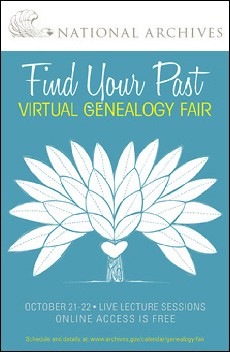Although, we have missed the first day, tomorrow looks interesting.
For free?
The Legal Genealogist knows what you should be doing — and what I’ll be doing.
I’m going to be attending the U.S. National Archives Virtual Genealogy Fair — it’s online and it’s free.
It’ll kick off tomorrow morning at 10 a.m. EDT via live stream from NARA’s YouTube channel with opening remarks by David S. Ferriero, Archivist of the United States.
That’ll be followed by 10 terrific presentations over two days about the records of the National Archives — and tips and tricks for genealogists and family historians — taught by genealogy experts from National Archives locations across the nation.
Thursday, October 22
10 a.m. EDTWhere’d They Go? Finding Ancestral Migration Routes by Jean Nudd (National Archives at Boston)
Our ancestors were mobile, and families moved, sometimes across an ocean but just as often via land routes to the western frontier. Where they went, how they got there, and why they moved adds flavor and depth to our research and family knowledge. This lecture outlines some of the Federal and local records that can be used for this research.
11 a.m. EDT
Access to Archival Databases (AAD): Looking Down, From Above, to Look it Up! by John LeGloahec (Archives II, College Park, Md.)
The Electronic Records Division of the National Archives holds hundreds of thousands of records in its custody. Many of the records of the division are of great interest and are helpful to genealogists looking to fill in the gaps in their family histories. In this presentation, John LeGloahec, an archives specialist with the Electronic Records Division, will highlight the wide range of records and access tools that can assist researchers in finding their roots. John will also highlight NARA’s Access to Archival Databases (AAD), which provides item-level records to researchers on a variety of subject areas. Every year, the Electronic Records Reference Branch receives thousands of inquiries about the holdings of the Electronic Records Division. Many of these inquiries concern military service or casualty information, which is what this office makes available most often. Within AAD are more than 100 million “stand-alone” records that are easily understood on their own and do not require supporting records.
12 p.m. EDT
Finding Your World War I Veteran at the National Archives at St. Louis by Theresa Fitzgerald (National Archives at St. Louis, MO)
This presentation highlights the records and resources at the National Archives at St. Louis utilized to locate military service information concerning World War I Veterans. It details multiple record series, including but not limited to, Official Military Personnel Files, Deceased Veteran Claim Files, World War I Burial Files, and General Courts-Martial records. It will include all records that are available to the public and an overview of the information and documents typically found in these files. Procedures will also be explained for how to access these records for both on-site and off-site researchers.
1 p.m. EDT
Women in War Time Civilian Government Employment by Cara Moore (National Archives at St. Louis, MO)
During the First and Second World Wars many government agencies hired female employees to both aid in the wartime efforts and to perform jobs previously filled by men. This employment created an extensive paper trail in an area that is traditionally harder to track: female genealogy. Genealogy for a woman’s family can be more difficult to track due to the traditional taking of the man’s last name. The civilian Official Personnel Folders of various departments, such as the Department of the Army/Air Force (Department of War prior to 1939), Department of the Navy, and Department of State, often recorded the maiden names of married women as well as their parents’ names and addresses, and sometimes even their mother’s maiden name. These records include addresses of the employee throughout employment and post-employment for retirement benefit purposes. I will cover the content of these series and how they can aid in genealogical research specifically pertaining to female employees.
2 p.m. ET
Broke, But Not Out of Luck: Exploring Bankruptcy Records for Genealogy Research by Jessica Hopkins (National Archives at St. Louis, MO)
The United States has seen many economic “ups and downs.” Rich and poor alike have seen their finances crash, and have been left with no option but bankruptcy. Bankruptcy records contain a wealth of details that can be found in few, if any, other places. These facts can include items owned by an individual or company as well as a listing of whom they borrowed from. This class will take a look at what bankruptcy records are available, what type of information can be found, and demonstrate how to research the records.
So where will I be tomorrow and Thursday? At the Fair, of course. My mother’s father was in World War I. My uncle was in the Civilian Conservation Corps. And most of my family has always been broke. So where else would I be but at the Fair?
Come on out and join me, at the National Archives Virtual Genealogy Fair!
And, as always, if you have to miss one of these presentations in real time, they’ll be recorded for viewing later on NARA’s YouTube channel.



